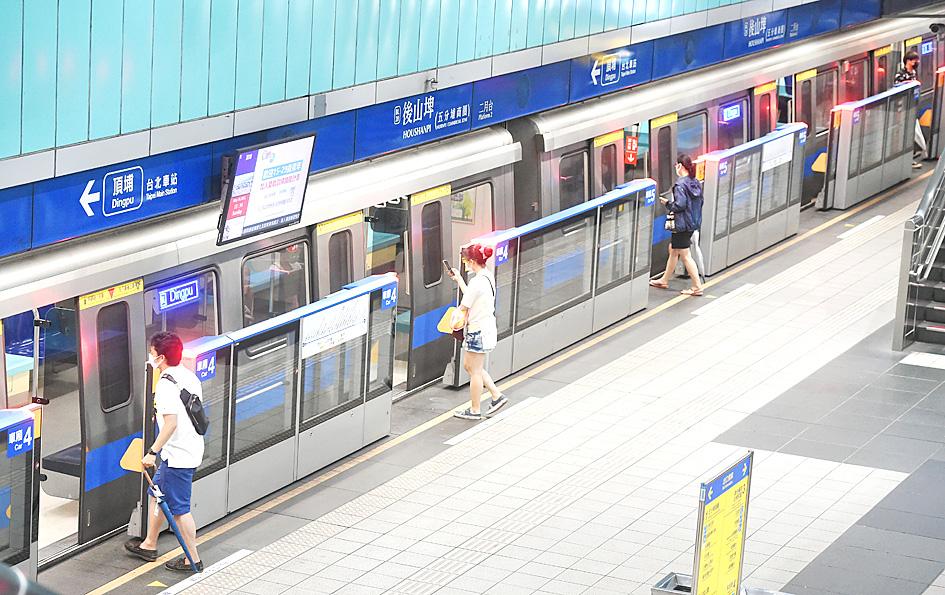The Taipei City Government yesterday conducted a simulation for a level 4 lockdown, which would close all nonessential businesses and bar entrance into the city.
The death toll from COVID-19 in Taiwan has surpassed that of SARS in a scene unfathomable at this time last year, Taipei Mayor Ko Wen-je (柯文哲) said.
There is evidence that the situation has stabilized over the past three days, as ambulances are no longer being turned away from hospitals due to a lack of beds, he said.

Photo: CNA
However, if the situation continues, “quantitative changes would create qualitative ones,” Ko said, asking what would happen if the city must lock down for months or if cases surge once more.
Therefore, the city must “plan for the worst to be best prepared,” he added.
In the simulation, participants led by Ko practiced mobilizing the city government to manage all levels of response with the goal of identifying problematic areas.
The first step would be commanding the Taipei Epidemic Command Center to remain open around the clock, while each administrative district would be instructed to set up disaster response centers, the city government said.
The city would also coordinate closely with the governments of Keelung, New Taipei City and Taoyuan, it said.
All schools and offices would be closed, and no one would be allowed to go outside except to buy food or seek medical treatment, or to perform other necessary or official duties, it added.
In addition, roadblocks would be erected to restrict movement between regions, the city said.
Seventy-one control points would be set up on access roads and highway ramps to restrict the flow of private vehicles into the city, while trains would not stop at stations within Taipei, it said.
All mass transit services would only operate within city limits, meaning that MRT service between Taipei and New Taipei City would be suspended, the city government said.
The YouBike service would also be suspended, it added.
Police would be dispatched for crowd control at markets, which would be instructed to restrict sales of certain items if supply becomes limited, it said.
About 21,000 essential businesses would be allowed to operate, including restaurants, bakeries, fruit and vegetable vendors, gas stations and supermarkets, it said.
Traditional markets would operate with limited hours, it added.
As for medical supplies, the city said it would seek assistance from the Ministry of Health and Welfare to establish backup hospitals and evaluate the potential of converting regional hospitals into specialized COVID-19 facilities.
It would also aim to provide 1,400 quarantine hotel rooms, it said.
If fatalities surpass the city’s daily cremation capacity of 224 bodies, temporary morgues could be established to store up to 200 bodies, it added.
Finally, the Taipei City Government said it would request assistance from the 6th Army Command 33rd Chemical Corps to sanitize the city, while 1,270 troops from the military’s disaster relief force could be deployed initially.

An essay competition jointly organized by a local writing society and a publisher affiliated with the Chinese Communist Party (CCP) might have contravened the Act Governing Relations Between the People of the Taiwan Area and the Mainland Area (臺灣地區與大陸地區人民關係條例), the Mainland Affairs Council (MAC) said on Thursday. “In this case, the partner organization is clearly an agency under the CCP’s Fujian Provincial Committee,” MAC Deputy Minister and spokesperson Liang Wen-chieh (梁文傑) said at a news briefing in Taipei. “It also involves bringing Taiwanese students to China with all-expenses-paid arrangements to attend award ceremonies and camps,” Liang said. Those two “characteristics” are typically sufficient

A magnitude 5.9 earthquake that struck about 33km off the coast of Hualien City was the "main shock" in a series of quakes in the area, with aftershocks expected over the next three days, the Central Weather Administration (CWA) said yesterday. Prior to the magnitude 5.9 quake shaking most of Taiwan at 6:53pm yesterday, six other earthquakes stronger than a magnitude of 4, starting with a magnitude 5.5 quake at 6:09pm, occurred in the area. CWA Seismological Center Director Wu Chien-fu (吳健富) confirmed that the quakes were all part of the same series and that the magnitude 5.5 temblor was

The brilliant blue waters, thick foliage and bucolic atmosphere on this seemingly idyllic archipelago deep in the Pacific Ocean belie the key role it now plays in a titanic geopolitical struggle. Palau is again on the front line as China, and the US and its allies prepare their forces in an intensifying contest for control over the Asia-Pacific region. The democratic nation of just 17,000 people hosts US-controlled airstrips and soon-to-be-completed radar installations that the US military describes as “critical” to monitoring vast swathes of water and airspace. It is also a key piece of the second island chain, a string of

The Central Weather Administration has issued a heat alert for southeastern Taiwan, warning of temperatures as high as 36°C today, while alerting some coastal areas of strong winds later in the day. Kaohsiung’s Neimen District (內門) and Pingtung County’s Neipu Township (內埔) are under an orange heat alert, which warns of temperatures as high as 36°C for three consecutive days, the CWA said, citing southwest winds. The heat would also extend to Tainan’s Nansi (楠西) and Yujing (玉井) districts, as well as Pingtung’s Gaoshu (高樹), Yanpu (鹽埔) and Majia (瑪家) townships, it said, forecasting highs of up to 36°C in those areas